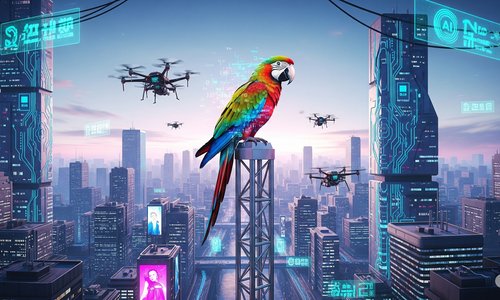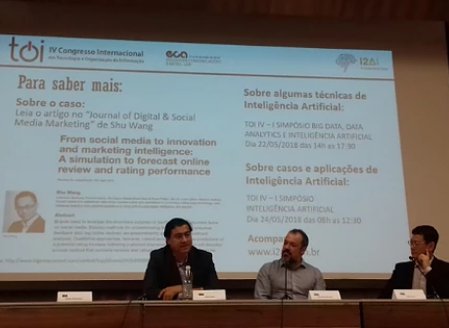
A Promessa e o Perigo da Nova Revolução Digital
A nova corrida tecnológica global levanta uma pergunta urgente: estamos prontos para confiar na inteligência que criamos?

Participei do I Simpósio de Informação Corporativa e Gestão do Conhecimento do IV TOI – Congresso Internacional em Tecnologia e Organização da Informação que ocorreu no dia 17 de maio de 2018 na Biblioteca Brasiliana Guita e José Midlin (USP).
O Prof. Francisco Carlos Paletta (ECA-USP) do Grupo de Pesquisa Observatório do Mercado de Trabalho em Informação e Documentação (OMTID) – CNPQ - abriu o simpósio comentando sobre a importância de um evento como esse para compartilhar informações entre a universidade e o setor produtivo, citando também o sucesso do IV TOI com mais de 2.000 inscritos.
A primeira mesa abordou os impactos da inteligência artificial e da ciência de dados nas atividades de inteligência. A primeira palestra foi realizada pelo Sandro Sinhorigno – Superintendente de Modelagem do Banco Itaú – e teve como tema o uso dos dados para definir a liberação de crédito, tanto antigamente como na atualidade, tendo em vista o aumento do volume e da variedade de dados, principalmente os não estruturados. Também citou o case do COIN (Contract Intelligence) da JPMorgan que realiza automaticamente análises de acordos de empréstimos, tarefa que consumia, em média, 360 mil horas de trabalho por ano de advogados e agentes de crédito. Hoje, além de revisar os documentos em segundos, o software também é menos propenso a erros.
A segunda palestra realizada pelo Prof. Alexandre Del Rey – Sócio Fundador do I2AI (International Association of Artificial Intelligence) e da Engrama – apresentou o case da Philips, que começou a relacionar os dados disponíveis gratuitamente no Rating (nota) e nos Reviews (comentários) dos seus produtos no site da Amazon para criar inovações nos produtos que realmente impactam os consumidores e assim aumentou em 15% o volume de vendas da sua linha Premium.
O Prof. Andre Saito – Presidente da Sociedade Brasileira de Gestão do Conhecimento – moderador da mesa, destacou as questões do público relacionadas com o perfil necessário para o profissional de informação nesse contexto atual de big data e inteligência artificial. Principalmente, qual seria o diferencial do ser humano nesse mercado de trabalho, no qual os computadores possuem uma capacidade de processamento de informação muito maior, mais rápida e hoje com um valor mais acessível para as empresas.
Os palestrantes foram enfáticos em afirmar que a máquina sempre possui um domínio restrito, a capacidade de criar links entre as informações, analisar e monetizar os dados, entender o comportamento humano, saber fazer as perguntas certas, selecionar os dados realmente importantes, usar os dados com criatividade, ainda são funções exclusivamente humanas. A inteligência artificial segue as regras e a metodologia definidas pelo ser humano e nem sempre consegue analisar diferentes contextos.
Nesse momento, lembrei de uma notícia que li sobre uma pesquisa da Universidade de Lisboa que está desenvolvendo um modelo de aprendizado de máquina capaz de identificar mensagens no Twitter que tenham caráter distorcido e assim verificar postagens que possuem tom de ironia e sarcasmo, algo difícil para os computadores que leem as informações em sentido literal.
Sandro Sinhorigno complementou a discussão com o conceito de inteligência aumentada que tem como base sistemas com inteligência cognitiva que apóia o ser humano, seus planejamentos e análises, liberando o tempo dos profissionais para outras atividades.
Os palestrantes também afirmaram a necessidade de possuir uma equipe multidisciplinar para o sucesso dessas atividades, já que dificilmente existirá um profissional “unicórnio” que possuirá todas as competências necessárias. No entanto, será cada vez mais importante que os profissionais aprendam o mínimo necessário de outras áreas para poder dialogar com os outros membros dessa equipe multidisciplinar.
As duas palestras foram gravadas e estão disponíveis no link: https://www.youtube.com/watch?v=LjLj3ff-pvc.
Recomendo que todos os profissionais de informação assistam na íntegra!
Após o término dessa primeira mesa, no intervalo para a próxima, conversando com outros bibliotecários presentes no evento, discutimos como várias questões mencionadas pelos palestrantes estão diretamente ligadas à nossa área. Já possuímos competências de organizar e criar links entre os dados, transformar dados não estruturados em estruturados, localizar e selecionar o dado realmente importante, fazer as perguntas certas no momento de uma pesquisa, precisamos somente transpor os conhecimentos e as metodologias anteriores focados em livros e documentos para essa nova realidade.
Bacharel em Biblioteconomia e Documentação pela Universidade de São Paulo. Cursou Inteligência Competitiva para Resultados na Escola Superior de Propaganda e Marketing. Membro técnico do grupo de pesquisa Observatório do Mercado de Trabalho do Profissional da Informação na Era Digital da Universidade de São Paulo. Administra o grupo IA Biblio BR criado no LinkedIn que possui como objetivo compartilhar eventos, estudos, vagas, matérias e notícias relacionados ao tema Biblioteconomia e Inteligência Artificial. Experiência profissional em dados, informação, conteúdo e gestão do conhecimento para negócios e tecnologia. Carreira consolidada em empresas de pequeno, médio e grande porte. Foco de estudo: Ciência da Informação, Web Semântica, Representação de Conhecimento, Recuperação da Informação, Inteligência Artificial, Processamento de Linguagem Natural, Gestão de Dados, Metadados e Enriquecimento de Dados.

A nova corrida tecnológica global levanta uma pergunta urgente: estamos prontos para confiar na inteligência que criamos?

Por que dominar a IA será a nova alfabetização do século XXI

Conselhos de Administração devem evoluir da supervisão reativa para a antecipação estratégica, frente à crescente complexidade e volatilidade dos ambientes de negócios.

De 14 a 25 de julho, reserve suas manhãs das 08h00 às 09h30 para participar da tradicional Maratona I2AI! Uma jornada intensa com debates e palestras sobre temas essenciais: Ética,